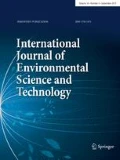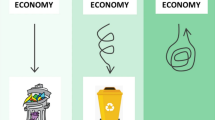Abstract
Keeping temperature rise well below 2 °C is Paris Climate Agreement’s main commitment and corporate-level participation will be crucial to achieve national mitigation targets. Hence, companies should adopt measures that allow them to adapt to upcoming scenarios where low-carbon production is expected to become mandatory and a great competitive advantage. However, mitigation strategies cannot be evaluated without consideration of subjective environmental criteria. Consequently, lack of decision support methodologies for climate change evaluation in industries is a barrier for innovation. Aiming at consideration of non-monetary aspects, we develop a support method that incorporates costs, benefits, opportunities and risks related to climate change in manufacturing industries. First, we compared the most relevant multi-criteria decision analysis methodologies and identified an Analytic Hierarchy Process (AHP) as the most suitable for ranking corporate climate change strategies. Then, we collected global analysis criteria from the most important socially responsible investment indices, and climate change scientific studies. To adapt these criteria to the AHP method, each criterion was sorted into benefits, opportunities, costs or risks hierarchies. Proposed method was efficient for assessing long-term subjective criteria and ranking alternatives for GHG emission management in two large manufacturing companies. A sensitivity analysis of the outcome revealed its consistency and flexibility for ranking alternatives and weighting criteria. Finally, the method is not limited to a particular type of industry and it can be adapted to other areas, such as service companies, sanitation or public sector.



Similar content being viewed by others
Notes
Super Decisions latest stable and beta versions are freely available at www.superdecisions.com.
References
Alexander A, Walker H, Naim M (2014) Decision theory in sustainable supply chain management: a literature review. Supply Chain Manag An Int J 19:504–522. doi:10.1108/SCM-01-2014-0007
Arsenova I (2013) New application of bibliometrics. Procedia Soc Behav Sci 73:678–682. doi:10.1016/j.sbspro.2013.02.105
Bas E (2013) The integrated framework for analysis of electricity supply chain using an integrated SWOT-fuzzy TOPSIS methodology combined with AHP: the case of Turkey. Int J Electr Power Energy Syst 44:897–907. doi:10.1016/j.ijepes.2012.08.045
Bertsch V, Fichtner W (2016) A participatory multi-criteria approach for power generation and transmission planning. Ann Oper Res 245:177–207. doi:10.1007/s10479-015-1791-y
BM&FBOVESPA (2017) Corporate sustainability index. Climate Change Aspect, ISE 1-8, Brazil. http://www.bmfbovespa.com.br/pt_br/produtos/indices/indices-de-sustentabilidade/indice-de-sustentabilidade-empresarial-ise.htm. Accessed 28 Jun 2017
Borba BSMC, Lucena AFP, Rathmann R, Costa IVL, Nogueira LPP, Rochedo PRR, Castelo Branco DA, Junior MFH, Szklo A, Schaeffer R (2012) Energy-related climate change mitigation in Brazil: potential, abatement costs and associated policies. Energ Policy 49:430. doi:10.1016/j.enpol.2012.06.040
Chatterjee K, Kar S (2016) Multi-criteria analysis of supply chain risk management using interval valued fuzzy TOPSIS. Opsearch 53:474–499. doi:10.1007/s12597-015-0241-6
Chunark P, Thepkhun P, Promjiraprawat K, Winyuchakrit P, Limmeechokchai B (2015) Low carbon transportation in Thailand: CO2 mitigation strategy in 2050. Springer International Publishing. doi: 10.1186/s40064-015-1388-6
Di Iaconi C, Del Moro G, Bertanza G et al (2017) Upgrading small wastewater treatment plants with the sequencing batch biofilter granular reactor technology: techno-economic and environmental assessment. J Clean Prod 148:606–615. doi:10.1016/j.jclepro.2017.02.034
Erdoğmuş Ş, Kapanoglu M, Koç E (2005) Evaluating high-tech alternatives by using analytic network process with BOCR and multiactors. Eval Progr Plann 28:391–399. doi:10.1016/j.evalprogplan.2005.07.003
FGVces (2014) Corporate Sustainability Index. ISE 1–4, Brazil
FTSE (2014) Index inclusion rules for the FTSE4Good index series. 1.8. http://www.ftse.com/products/downloads/F4G-Index-Inclusion-Rules.pdf. Accessed 15 Dec 2016
GSIA (2015) Global sustainable investment review. http://www.gsi-alliance.org/members-resources/global-sustainable-investment-review-2014/. Accessed 11 Nov 2016
Guitouni A, Martel J (1998) Tentative guidelines to help choosing an appropriate MCDA method. Eur J Oper Res 109:501–521
IPCC (2013) Climate change 2013: the physical science basis. Contribution of Working Group I to the fifth assessment report of the intergovernmental panel on climate change [Stocker TF, Qin D, Plattner GK, Tignor M, Allen SK, Boschung J, Nauels A, Xia Y], Cambridge, United Kingdom and New York, USA
IPCC (2014a) Climate change 2014: Mitigation of climate change. Working Group III contribution to the IPCC 5th assessment report—Changes to the underlying Scientific/Technical Assessment. Berlin
IPCC (2014b) Climate change 2014: impacts, adaptation, and vulnerability. Part A: global and sectoral aspects. Contribution of Working Group II to the fifth assessment report of the intergovernmental panel on climate change. Cambridge, United Kingdom and New York, USA
Ishizaka A, Nemery P (2013) Multi-criteria decision analysis: methods and software. Wiley, Chichester
Katzenbach J, Smith D (1993) The wisdom of teams: creating the high-performance organization. Harvard Business School Press, Boston
Kumar A, Sah B, Singh AR et al (2017) A review of multi criteria decision making (MCDM) towards sustainable renewable energy development. Renew Sustain Energy Rev 69:596–609. doi:10.1016/j.rser.2016.11.191
Lee AHI, Chang H-J, Lin C-Y (2009) An evaluation model of buyer–supplier relationships in high-tech industry—The case of an electronic components manufacturer in Taiwan. Comput Ind Eng 57:1417–1430. doi:10.1016/j.cie.2009.07.012
Liang C, Li Q (2008) Enterprise information system project selection with regard to BOCR. Int J Proj Manag 26:810–820. doi:10.1016/j.ijproman.2007.11.001
JSE Limited (2014) SRI index: background and criteria. 1–15
Mattiussi A, Rosano M, Simeoni P (2014) A decision support system for sustainable energy supply combining multi-objective and multi-attribute analysis: an Australian case study. Decis Support Syst 57:150–159. doi:10.1016/j.dss.2013.08.013
Merad M, Dechy N, Serir L, Grabisch M, Marcel F (2013) Using a multi-criteria decision aid methodology to implement sustainable development principles within an organization. Eur J Oper Res 224(3):603–613. doi:10.1016/j.ejor.2012.08.019
Moghaddam NB, Nasiri M, Mousavi SM (2011) An appropriate multiple criteria decision making method for solving electricity planning problems, addressing sustainability issue. Int J Environ Sci Technol 8:605–620. doi:10.1007/BF03326246
Paramasivam V, Senthil V, Rajam Ramasamy N (2011) Decision making in equipment selection: an integrated approach with digraph and matrix approach, AHP and ANP. Int J Adv Manuf Technol 54:1233–1244. doi:10.1007/s00170-010-2997-4
Reichert P, Langhans SD, Lienert J, Schuwirth N (2015) The conceptual foundation of environmental decision support. J Environ Manage 154:316–332. doi:10.1016/j.jenvman.2015.01.053
ROBECOSAM (2014) Measuring intangibles: ROBECOSAM’s corporate sustainability assessment methodology. Zurich
Rogers M, Bruen M, Maystre L-Y (2010) Electre and decision support. Kluwer Academic Publishers, Norwell
Saaty TL (1999) Decision making for leaders: the analytic hierarchy process for decisions in a complex world. RWS Publications, Pittsburgh
Saaty TL (2000) Fundamentals of decision making and priority theory with the analytic hierarchy process. RWS Publications, Pittsburgh
Sandberg B, Aarikka-Stenroos L (2014) What makes it so difficult? A systematic review on barriers to radical innovation. Ind Mark Manag 43:1293–1305. doi:10.1016/j.indmarman.2014.08.003
Shahabi R, Basiri MH, Rashidi Kahag M, Ahangar Zonouzi S (2014) An ANP–SWOT approach for interdependency analysis and prioritizing the Iran’s steel scrap industry strategies. Resour Policy 42:18–26. doi:10.1016/j.resourpol.2014.07.001
Shen L, Muduli K, Barve A (2013) Developing a sustainable development framework in the context of mining industries: AHP approach. Resour Policy. doi:10.1016/j.resourpol.2013.10.006
Silver SD (2014) Designing technology for managing the information exchange of decision making teams. Decis Support Syst 61:136–146. doi:10.1016/j.dss.2014.02.005
Sola AVH, Mota CMDM (2012) A multi-attribute decision model for portfolio selection aiming to replace technologies in industrial motor systems. Energy Convers Manag 57:97–106. doi:10.1016/j.enconman.2011.12.013
Stein EW (2013) A comprehensive multi-criteria model to rank electric energy production technologies. Renew Sustain Energy Rev 22:640–654. doi:10.1016/j.rser.2013.02.001
Theissen S, Spinler S (2014) Strategic analysis of manufacturer-supplier partnerships: an ANP model for collaborative CO2 reduction management. Eur J Oper Res 233:383–397. doi:10.1016/j.ejor.2013.08.023
UN (2014) Climate summit 2014—Catalyzing action. http://www.un.org/climatechange/summit/action-areas/. Accessed 1 Dec 2016
UN Global Compact (2014) Guide to corporate sustainability. Shaping a sustainable future. New York
UNEP (2011) MCA4climate: a practical framework for planning pro-development climate policy. Paris
Wijnmalen DJD (2007) Analysis of benefits, opportunities, costs, and risks (BOCR) with the AHP–ANP: a critical validation. Math Comput Model 46:892–905. doi:10.1016/j.mcm.2007.03.020
Xu P, Chan EHW (2013) ANP model for sustainable Building Energy Efficiency Retrofit (BEER) using Energy Performance Contracting (EPC) for hotel buildings in China. Habitat Int 37:104–112. doi:10.1016/j.habitatint.2011.12.004
Yang MC (2010) Consensus and single leader decision-making in teams using structured design methods. Des Stud 31:345–362. doi:10.1016/j.destud.2010.03.002
Yazgan HR, Boran S, Goztepe K (2010) Selection of dispatching rules in FMS: ANP model based on BOCR with choquet integral. Int J Adv Manuf Technol 49:785–801. doi:10.1007/s00170-009-2416-x
Zhang XF, Zhang SY, Hu ZY, Yu G, Pei CH, Sa RN (2012) Identification of connection units with high GHG emissions for low-carbon product structure design. J Clean Prod 27:118–125. doi:10.1016/j.jclepro.2012.01.011
Acknowledgements
The authors thank Professor Ph.D. Maurício Dziedzic for kindly sharing his knowledge on decision support theory and Graduate Program (Master and Doctorate) in Environmental Management, Universidade Positivo, in Curitiba/Brazil, for providing research facilities to develop this study.
Author information
Authors and Affiliations
Corresponding author
Ethics declarations
Conflict of interest
No competing financial interests.
Additional information
Editorial responsibility: Mohamed Fathy Yassin, Ph.D.
Electronic supplementary material
Below is the link to the electronic supplementary material.
Rights and permissions
About this article
Cite this article
Mistage, O., Bilotta, P. Decision support method for GHG emission management in industries. Int. J. Environ. Sci. Technol. 15, 1331–1342 (2018). https://doi.org/10.1007/s13762-017-1505-x
Received:
Revised:
Accepted:
Published:
Issue Date:
DOI: https://doi.org/10.1007/s13762-017-1505-x




